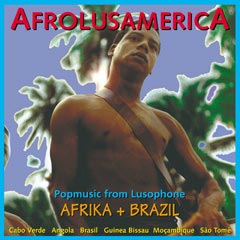AfroLusAmérica. Popmusic
From Lusophone Africa & Brazil
Various Artists
| CD 68.980 |
Afrolusamerica is the collective noun for regions the Portuguese had occupied in Africa and South America after discovering the Cape Verdian Islands around 1490, and lost again many centuries later.
 Afrolusamerica is an area connected by a mutual language. As
much as history and fate of the African nations and the Afrobrazilians may
differ, there are, indeed, cross connections in their past and present uniting
Africans and Brazilians - sometimes via Portugal.
Afrolusamerica is an area connected by a mutual language. As
much as history and fate of the African nations and the Afrobrazilians may
differ, there are, indeed, cross connections in their past and present uniting
Africans and Brazilians - sometimes via Portugal.
This does not only relate to music but also to lingual and ritual spheres. Unlike Brazil, the Lusafricans had little opportunity so far to place their popmusic internationally, as even productions for their local market are only just starting and are often wound up via Lisboa.
Thus, it is easy to understand that the facettuous Música Popular Brasileira with internationally successful artists received much more attention in Angola or Mindelo than Angolan music in Rio.
Our compilation Afrolusamerica is neither documentation nor representation. One CD alone would never be a sufficient documentation for so many regions if it was not meant to give just a minimal impression. If this CD would have wanted to represent the charts of the popmusic market of these countries, the audience would soon be tired from the monotony of home-made upbeat numbers. The 20 songs of this CD want to convey an impression of the multitude of contemporary Afro-Lusamerican popmusic, presenting as many Lusitanian and African varieties as possible.
The contributions from Brazil have been selected especially with respect to direct relations and encounters of the artists with Africa because for me it seemed appropriate to the influence Africa has had on Música Popular Brasileira as well.
Claus Schreiner
AfroLusAmérica
The second-large African country (after Nigeria) is Brazil - that’s what the Brazilians of African origin say , but even in Salvador, the most African of all Brazilian cities much less is known about Africa as, for example, in Portugal. Portugal’s capital Lisbon is one of the most African cities of Europe (apart from Paris and London).
In Africa, however, especially in Angola and Cabo Verde, Guinea-Bissau, Moçambique and São Tomé e Príncipe people register very carefully what is coming from Brazil, what has become of the common cultural roots. In the Sixties and Seventies, African artists protested together with the Portuguese against the fascist dictatorship which never could have been defeated without the uprise of African nations - an uprise that had found a cultural expressions of its own kind. Music and history stand in dialectic relation and form together the complicated band linking seven countries all over the globe in a culture of their own, even more than a common language: Afrolusamérica - Angola, Brazil, Cabo Verde, Guinea-Bissau, Moçambique, Portugal and São Tomé e Principe.
When Portuguese conquerors had taken hold of Africa and America in the name of the Portuguese monarchy more than five hundred years ago, the main reason was to secure the ocean traffic to India; treasures of the soil and shares in the slave market came next. The colonialization by the Portuguese was done without plan and in a very chaotic manner: yet in Brazil, the Europeans had soon pushed aside the native population and taken hold of the land; the Africans were the last to come - by force. In Africa, however, the Portuguese settled mainly along the coastline, cultivated plantations where the Africans had to work and had children with African „concubines" which they never accepted as their own - just like the Brazilian landowners treated their female slaves.
And yet, something in Africa was happening in the Twenties of our century,
that Brazilian avantgarde called cultural anthropopaghy. The suppressed Africans
got hold of parts of their oppressors’ culture and used it for reasons
of their own. From the Portuguese language, various Creole dialects were created,
Portuguese forms of folklore and music went into the rich fundus of African
native cultures and thus survived their disappearance in their mother country.
The forceful union of various African and European cultures, especially on
the Cape Verdian Islands and São Tomé e Príncipe fostered
unique forms of songs, new rhythm combinations, and finally brought together
European and African instruments from different regions.
More info on the CD Afrolusamerica
